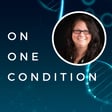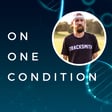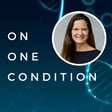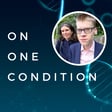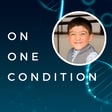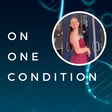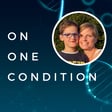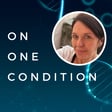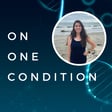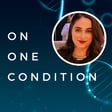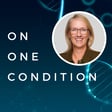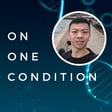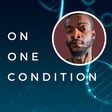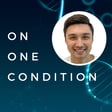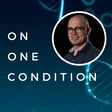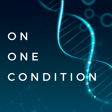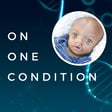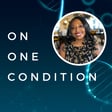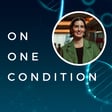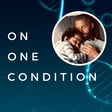Become a Creator today!Start creating today - Share your story with the world!
Start for free
00:00:00
00:00:01

Episode 66: Taylor Coffman - aHUS
Taylor shares her traumatic and transformative journey of being diagnosed with a rare condition – atypical hemolytic uremic syndrome (aHUS) – triggered during childbirth. Her story is one of medical chaos, survival against all odds, and learning to mother through unimaginable obstacles. With grace and humour, Taylor opens up about the physical devastation of her illness, the emotional toll of being separated from her newborn daughter, and the importance of timely diagnosis and innovative treatments. She also reflects on how becoming a patient changed her relationship with vulnerability, resilience, and advocacy.
The song Taylor chose is Be (For July) by Dustbowl Revival, written by her husband Zach Lupetin for their daughter.
Transcript
00:00:00
Speaker
Hi, I'm Sylvain Bertolo and you're listening to On One Condition, ah podcast to raise awareness about health conditions by listening to people who live them every day. My guest today is Taylor Kaufman and we're going to talk about AHUS.
00:00:16
Speaker
Hi, Taylor. Hi. Good see you. good Good morning from Los Angeles. And good evening from the UK. It's very nice to have you on the podcast.
00:00:27
Speaker
And as you know, i love starting with a song. So could you tell us which song you chose and why, please? Yeah, well, it it was an easy choice for me. My husband is a touring musician, so his band is called the Dust Bowl Revival. And they do come into the UK usually like once a year or so. So you'll have to come see them. I'm hopeful to come visit with them.
00:00:50
Speaker
And so his song, the song that I'm starting with today is called B for July. During my disease onset, it was an incredibly...
00:01:01
Speaker
Dramatic is almost like not enough of a word for what sort of happened during my pregnancy. and so And then birth, a pretty much the onset was during the birth.
00:01:12
Speaker
July is the name of my, well, she's now three, but he wrote this when she was, he started writing it when I was pregnant and then finished it when i had given after I had given birth. So it's It's a tribute to her, but also what we went through at that really very scary time.
00:01:32
Speaker
we'll We'll learn more about it, but I listened to the song. It's really, really nice. love it. Thank you. So you already started talking about the onset of your condition.
00:01:45
Speaker
Before we go into more details, can you tell us what A-H-U-S stands for? Yes. So AHUS is Atypical Hemolytic Uremic Syndrome.
00:02:00
Speaker
It also is going through perhaps a rebranding of sorts. A lot of the medical community would like to see the name evolve from AHUS. Right now, one of the sort of common names that you'll see might be complement-mediated thrombotic microangiopathy, or you might even see complement-mediated hemolytic uremic syndrome. Like that's also something that you might find out.
00:02:28
Speaker
It's still under a bit of a discussion and debate. Another version of the name, which would be for me, would be pregnancy-induced, no-known gene, complement-mediated thrombotic microangiopathy.
00:02:43
Speaker
Wow. Okay. How do you feel about that name change? I know you're not entirely sure. i Well, here's the thing I would say. I'm all for a name that saves lives.
00:02:55
Speaker
This disease, once you get a diagnosis... it a hat it's one of the 5% of rare diseases with a treatment. So as soon as you get a diagnosis or at least a path toward this diagnosis, you get an amazing drug that can save your life.
00:03:13
Speaker
And so I'm all for a name that is memorable and is clear for physicians and is also clear to help raise awareness. hi have been a bit outspoken that I do think the a little bit of the alphabet soup that we seem to be swimming in and may not be the most creative. I'd love to see a little bit more, maybe less clinical, more creative thought, perhaps even an acronym that people could really sort of anchor onto and and whatnot. And also the acronym currently is very fluid. They they sort of, you're one thing at onset and then maybe you're something else as more information becomes clearer about your case.
00:03:54
Speaker
And I have been a tad critical about that. I don't think a fluid acronym is maybe, people are just trying to get their heads wrapped around their situation and yeah And if if you give me a name that changes, it's also maybe not great for advocacy and fundraising. So I would love for create creative folk and physicians and patients to get get in a room together and maybe think of something a little bit more.
00:04:22
Speaker
Like I really love the disease name health. It's an acronym, but it also has like a name we can remember. Yeah, yeah. Disease names are a tricky thing. I know there's a lot of debate out there about disease names, but yes, this one is ongoing. So ah in the meantime, if you want to Google this disease, you can use AHUS, but also complement mediated thrombotic microangiopathy is also one you could you could Google and find similar information if you're playing Dr. Google or you want to look up more of the disease.
00:04:54
Speaker
I'd also just add to like thrombotic microangiopathy for anyone who doesn't know, means tiny blood clots. So if you're listening and you're this is washing over you like salad dressings at a restaurant, tiny blood clots is a hallmark of the disease.
00:05:08
Speaker
So that's why it's sort a lot of physicians would like to kind of set it aside as a major part of the name. um However, you know, tens of thousands of people could have thrombotic microangiopathy that happens with cancer, it happens with other pregnancy issues, and even including preeclampsia. So my argument on that is, it's ah it's a major part of my disease, but it's also a part of other diseases.
00:05:35
Speaker
And so for me, like you might have 10,000 people with TMA, but only maybe 3,000 of those have my disease. So there's a lot of debate.
00:05:45
Speaker
Getting the confusing stuff out of the way before we talk more. Yeah, and what's important for you is that the the name helps get people diagnosed in a way so that there's no ambiguity.
00:05:58
Speaker
That's right. a name for this disease is a direct path for saving lives. yeah And that is something I'm incredibly passionate about as an advocate for sure. Yeah. So you just mentioned saving lives. How life-threatening was it for you?
00:06:16
Speaker
Well, I had a lot of doctors who did not think I was going to make it out of the hospital. Really? It's a violent disease. it's a really My mind nephrologist at the transplant center was like, this is a nasty disease. Once triggered, it can be incredibly fast-moving. Yeah.
00:06:35
Speaker
So you don't have days, right? You have sometimes hours. And I remember asking at one point I was doing a talk on my disease and I asked my physicians, like, what are your suggestions? Like, what should I bring up? cause So I was doing a talk for physicians and my hematologist was like, this is a disease you don't want to skip checking your messages about.
00:07:00
Speaker
i might I might be alive today because he checked his messages on a Saturday morning. Like this kind of disease doesn't wait for the weekend. You know what I mean? So yeah I think for clinicians or anyone else who's talking, if if you get the symptoms of this disease, it's something that really needs to take action. You can't you can't wait for Monday morning.
00:07:24
Speaker
I'm very lucky that they did not wait for Monday morning, essentially. Yeah. Okay. How did you discover it or how did the clinicians discover it? Well, it was so but it was a little bit of a path and a lot of really wise hunches.
00:07:39
Speaker
I was in the hospital being induced. I was about ah a week overdue for a baby. And ah she showed signs of some heart distress. And at that point, I had been there a few days. And so I said,
00:07:53
Speaker
If she's in distress, C-section is the best route here. i know You know, I sort of agree. I didn't fight that call at all. And we had the C-section. It was pretty unremarkable, as a physician would call it. a Very unremarkable C-section.
00:08:08
Speaker
She emerged from me as a blur of pink. I didn't even get to see her much. she sort They lifted her around they sort of, you know, they cut the cord. My husband got to see her. It was really exciting because we didn't know if it was a boy or a girl. So there was this sort of eruption of joy, you know, and they're like, it's a girl, you know, it was such an exciting moment.
00:08:27
Speaker
So they're taking care of her, checking her out, making sure she's okay before they bring her back to me. But while I'm there, you know i'm feeling what must be very common, just very tired. I remember feeling like I could fall asleep.
00:08:42
Speaker
All of a sudden, I had one nurse on me sort of hovering over monitoring, but she was sort of on the computer and my alarm started going off and She came back over and turned them off and she was like, oh, that they're they're very sensitive. Don't worry. yeah Just take a moment and rest.
00:08:58
Speaker
And then they just kept going off. And I remember this moment. I saw the moment of realization come over her face, this sort of wash of panic.
00:09:10
Speaker
fall on her face. And all of a sudden, i was sort of alone, actually. Everyone was sort of tending to the baby and all the things. And all of a sudden, I was rushed by medical professionals.
00:09:22
Speaker
It felt like a scene out of a movie, except for you're the one on the table. They had an amazing device. It sort of looks like a cell phone. They were so they scanned my abdomen. i was hemorrhaging. They were like, we got to take her back in. I had like literally just one moment to grab my husband's hand as they were wheeling me out.
00:09:39
Speaker
I told him I loved him. And then i was under for quite some time. I sort of have a lot of images, you know, kind of from that period, even something I will never really fully be able to understand, maybe even somewhat of an out of body experience.
00:09:56
Speaker
I was hemorrhaging and they didn't know from where. The doctors spent tireless night trying to save me. They were able to get me to be stable. It was so bad. my my My head doctor had to take a couple days off of work after trying to save me. It was incredibly life high stakes resuscitation. i didn't wake up from anesthesia right away.
00:10:22
Speaker
i was out ah a while. You know, my poor husband was just roaming the halls. No one had given him any update because it was so just on the fly, life-saving kind of efforts.
00:10:34
Speaker
It was so scary. ah When I woke up, I found myself on a ventilator, you know, unable to speak, on constant dialysis. So not even the kind of dialysis where you just go in for treatment. They had me like on the machine, just running the whole time in the ICU.
00:10:52
Speaker
ah had my baby like and It felt like late on a Wednesday, but really it was like 1 a.m. Thursday. and I didn't really wake up until Friday morning, essentially. I feel like I remember sort of vivid, like it's a little hazy, but I feel like it wast it was a much of a day later.
00:11:10
Speaker
At one point, actually, I do remember being able to hear, but I couldn't wake up. I have ah sort of flashes of of being able to hear them treating me. And I would i i laugh because...
00:11:24
Speaker
You know, at this point after it feels, it feels sort of crazy. I remember just being like trying to wiggle my toes to tell them I was there listening. And they all thought I was having a seizure.
00:11:36
Speaker
and I was like, is it wiggling my toes? Like the international sign of I'm, I'm, I'm here. I just can't wake up, you know? So it was an excruciating time. i woke up and then they, they thought I needed another surgery.
00:11:50
Speaker
just to make sure the bleeding wasn't continuing. But during this time, I got a set of labs that my nephrologist, at first they thought perhaps I had help, that which I mentioned earlier. It's another, um not common, but it happens during pregnancy. it's it's pretty It's pretty scary, but it resolves once you have the baby.
00:12:11
Speaker
But for me, the situation was was getting worse after I'd had the baby. So the nephrologist had told me that he observed that my platelets were incredibly low. and there were and at first they thought my kidney failure was due to shock.
00:12:25
Speaker
But he was like, this something is not quite right. So he was smart enough to call in a hematologist who I mentioned before checks his messages on the weekend. He, you know, over breakfast, ah saw the message and said, this woman might have this disease.
00:12:43
Speaker
And if she does have it, she needs this drug. It's called eculizumab right away. I wasn't awake really enough for my husband to have consent. So I always say everyone out there, you know, when you're falling in love, fall in love with someone who can make medical decisions on your behalf. because is it Is it part of the checklist?
00:13:03
Speaker
Yes, put it on the checklist. It's not super romantic, but it comes in handy because he spent ah much of the day messaging every medical professional relative we had. And they all they all came back with the answer, get it to it right away.
00:13:17
Speaker
Yeah. And so they gave me the infusion. And had I not gotten that infusion, I wouldn't be talking to you today. It was were able to give us more time. it slowed down the attack.
00:13:29
Speaker
So I finally was able to wake up and meet my baby, you know, days later. and then she went home without me.
00:13:40
Speaker
I didn't know if I was ever going to see her again. It was it was such a it was such like a beautiful but like truly bittersweet moment. you know you're You're meeting your child for the first time, but you're attached to a dialysis machine and you can't feed her and you know you have oxygen on. i i had sort of i hadd been on a ventilator. They took me off the ventilator and then they had to put me back on it again.
00:14:04
Speaker
But luckily when I met her, i I didn't have the ventilator on or I wasn't intubated. So I was able to, you know, see her and she could see me. but then she went home.
00:14:15
Speaker
That was at the end of January. i didn't come home till March. HOS is one of these diseases where it can attack the whole body. So that that's part of the also the reason of the name change because the hemolytic uremic part makes doctors just think kidneys.
00:14:33
Speaker
I unfortunately had thrombotic microangiopathy my pelvis, in my heart, in my lungs. These tiny blood clots migrated and then clumped together in other places. So I ended up with a heart attack, so heart failure. And then I had like lung, my lungs filled up with fluid.
00:14:54
Speaker
But also I had a pulmonary embolism. ah had a terrible case of hypoxia that sent me back to the... I would bounce in and out the ICU. I think when you're a young patient, sometimes you can look better than you are. So they kept like putting me on the floor and then something would happen and I'd wind up back in the ICU again.
00:15:13
Speaker
it due to the microclots? The TMA? Yeah, the microclots. Yeah. Yeah, they really caused a lot of havoc. and Okay. Okay. It was a situation of chaos. Like I would just change every few hours. You know, it was really hard for my medical team to keep up with the catastrophes. You know, I had one doctor tell me he started driving home and got an alert and had to drive back to the hospital. And they did another emergency surgery just like in my hospital room just to make sure i was like not still internally bleeding. At one point, they put me in an induced coma because it was just too dicey.
00:15:52
Speaker
All that was despite the treatment that yeah they they'd given you. Yes. So the thing about HUS, the treatment works.
00:16:03
Speaker
The earlier you get it, the better. It doesn't keep the damage that already happened. Okay. continuing. So, so I guess you could say that they kept me from getting worse from the disease. But the disease is like a very tricky disease in a few ways.
00:16:22
Speaker
So you have low platelets, which any physician here knows that's a bleeding problem. But you both have a bleeding problem and a clotting problem at the same time.
00:16:35
Speaker
Then also the disease is a disease of the complement system. So the drug basically tells your complement system to calm down. The complement system for anyone who's listening is sort of the BFF of the immune system.
00:16:49
Speaker
So it's basically immunocompromising. So what also happened to me is I needed desperately a drug that was immunocompromising, but then I got severe sepsis and pneumonia.
00:17:01
Speaker
So, you know, it was like, okay, so she's got this disease, but she also might die of sepsis. So when I woke up from the coma, you know, there were all these elements sort of being thrown at me.
00:17:14
Speaker
And i'm I was a project manager at my day job. And I just remember a lot of these doctors just felt like they weren't all, at least on a cohesive plan. You know, I had upwards of 20 doctors because i had so many body systems going wrong.
00:17:29
Speaker
And so just, I even remember just saying like, I don't feel like you guys are, most of them are guys. So I guess I can use that gender term, are communicating effectively.
00:17:42
Speaker
And so luckily, one physician heard me. he They organized my care in a much more cohesive, organized way. yeah and it allowed them to say, okay, we're going to first deal with the sepsis.
00:17:59
Speaker
And we'll wait to give her the drug until we get her white blood cells in a safe place. And then, so I was a little late on my second dose because they didn't want me to die of, you know, of the sepsis or the pneumonia.
00:18:16
Speaker
So they tackled that first. And then they went back and and got me more of the eculizumab to address the the disease. In the meantime, I'm still you know suffering from kidney failure, all of that. I even at one point you know got uremia.
00:18:36
Speaker
it was very much like I'd see progress and then it was a rollercoaster ride. So something would happen and then i was they were dealing with something else. And by the time I did get home,
00:18:49
Speaker
I was then the protocol, luckily, you know was I could get home, but I was still on every two weeks of this drug. And then every other day I was on dialysis. So even though I was home, I wasn't fully out of the woods because I had, you know, such damaged kidneys. But For as many bad things that happened to me, i also was incredibly lucky, if you can believe it or not. you know I had and' an astounding medical team.
00:19:20
Speaker
i had <unk> I was a pretty healthy person before all of this. I think you know I was the kind of person that walked to the bottom of the Grand Canyon one day and walked out the next day. just... I was strong. I had a strong pregnancy. So I was able to, after nine months of of dialysis, I was one of the 1% to 2% of people that got to graduate from dialysis without a new kidney.
00:19:45
Speaker
Incredibly amazing. And that's also partially in credit to the drug. Because even though I left the hospital with some signs of of disease activity, the drug was able to help but me maintain the kidney function that I had.
00:20:01
Speaker
And then i was able to do a great amount of healing along the way. Now I would say if you saw me walk down the street, you'd have no idea anything had ever happened.
00:20:11
Speaker
Yeah, I was about to to ask actually, are you fully recovered now? It's a good question. are you still at risk? I guess I'll answer it this way. There's no cure for the disease, right? So I manage it with regular infusions.
00:20:26
Speaker
Okay. every eight The eight-week version of the drug called ultimeris. And then i have i do have damaged kidney function. But would say have about what's akin to about stage three kidney disease.
00:20:42
Speaker
But what's also still amazing is my kidney function is still improving three years later. Like I had my best kidney lab ever a couple months ago. What I would say is a lot happened to my body.
00:20:57
Speaker
so i ended up going back to the hospital late November because i had had four abdominal surgeries when I was in the hospital. And that scar tissue was so bad.
00:21:09
Speaker
Three years later, i i was sort of i was almost staring down a colostomy bag. The scar tissue itself from all that activity and all those procedures was so bad. i had multiple bowel obstructions.
00:21:24
Speaker
that had to be taken care of. So I've had a lot of abdominal surgery. Hopefully, ah you know, that <unk> I'll be able to stay safe from that. But, you know, I sort of say like when you have so many medical things, sort of buy yourself a ticket to a carnival and you never know what ride you're going to end on. So I think I'm managing my disease quite well, but, you know, you just curveballs exist.
00:21:52
Speaker
And surgeries don't put you more at risk. Well, what I would say to that is yes and no. I'm always at risk of flare, potentially.
00:22:04
Speaker
i'm on the treatment. So it's not impossible to flare during treatment. We have seen, you know, in the small communities, people talk about flares during treatment.
00:22:15
Speaker
They're just not as bad or they're more manageable. They're not as devastating. There's a lot of folks, actually, with my disease who are good candidates to come off of treatment. But Like myself, I don't have a known gene for this disease.
00:22:31
Speaker
i always put like a little asterisk in that it's it's possible that I have a gene they just haven't discovered yet. So that's that's a possible reality. But, you know, a lot of folks without a gene who managed to recover kidney function or they just never lost it fully, they just had some acute kidney damage and they're they're okay. Like a lot of those folks choose to come off treatment.
00:22:54
Speaker
I don't have what we would call bench. Like if I were to get another flare, you know, I could wind up on dialysis again and need a new kidney. So we yeah we play it safe with me bit.
00:23:09
Speaker
So I probably won't be a candidate to come off treatment. At least while I'm a mom and have a lot of my youth, I want to make sure I have that insurance policy for sure. Yeah, yeah, I would be the same, I think.
00:23:21
Speaker
And when we first talked, you mentioned that you've been looking into clinical trials. Yeah, I think this disease, despite being incredibly but violent and scary, is also kind of a lucky disease in that there's a lot of science and innovation around the complement system and this disease.
00:23:42
Speaker
So there's two biosimilars that came out to the two-week version And they're developing very actively in clinical trials for a pill version, which would be amazing, amazing.
00:23:57
Speaker
And i would say that there's not a whole lot of us that have this disease. So when you have this diagnosis, that you will get the clinical trial email. like They will market to you. You know what I mean? like They're looking you.
00:24:11
Speaker
ah looking for you And I'm paying attention to these things because the infusion is not a walk in the park. It's a day where you don't feel great. It's not ah an amazing experience to actually, I mean, i don't have a port because I had a dialysis port for so long. So I was sort of like want yearning to be port free.
00:24:33
Speaker
it's no It's not fun. And then, you know, immunocompromised usually the week after. And I have a toddler, so I know what can say. It's not easy. So I definitely am eyeing these new versions of the drug. But, you know, I will say I know, you know, we talked about a lot of folks that sort of run clinical trials listen. And and I do think it is really hard for someone like me where I have a treatment that we know has me stable.
00:25:02
Speaker
I know there's a stable option for me. So anytime there's a drug out, I might be so curious. I might really, really want to try it. But you know for me with a child and already not having a ton of bench when it comes to risks, as far as my kidneys go, i just play it safe.
00:25:24
Speaker
So i'm not opting into the trials, even though they're they're literally in my city. you know I'm so so lucky. like They're right here. But for me, you know, and even though i really would love, especially the pill form, you know, I'm keeping my eye really closely on that, but the risk is too great.
00:25:42
Speaker
think a lot of folks jump on these trials because there isn't another option, but when there is, it's definitely trickier when your health is stable and you have found something that works.
00:25:54
Speaker
And when there's so much risk, as you said, for that that could take you back to ICU if it doesn't go well. Right, right, right. And have you discussed it with your clinical team?
00:26:07
Speaker
Well, they honestly, it's funny because I would say I am the rare patient that sometimes knows the stuff before even they do. Yeah, yeah, yeah. And and so we have talked about i They all know that i want to I would love to change once this all becomes approved and and things like that. i Again, a pill form would be amazing.
00:26:30
Speaker
It's also a question of here in the States, insurance too, which I'm sure folks outside of the States have that too, but Assurance can be really a tricky a tricky yeah thing here in the US.
00:26:44
Speaker
They really have to understand that it's there's a cost there's a cost savings for them. That's another piece of this puzzle, right? It'll be interesting to see after these things get developed, like, well, how much do they cost?
00:26:57
Speaker
Like, you know, is it something that is doable? And so I have a hope that a pill form could be the the more achievable route, but we'll see.
00:27:11
Speaker
How was it going back to your, like the first few weeks when you're at the hospital, you're in and out of ICU and your daughter is at home?
00:27:22
Speaker
know. How do you feel as as a mom? oh it was it was devastating. I think a big part of this journey involves...
00:27:34
Speaker
I mean, truly mental health as well. yeah So not only, you know, am I going through this, but I'm postpartum, which seemed a bit of an afterthought for a lot of the doctors.
00:27:46
Speaker
But that is an emotional time for a woman after giving birth. So we already had that. Also, too, I think I was really, really lucky in the in my hospital.
00:27:58
Speaker
They could see that still getting to see my baby was ah very important part of my mental health and healing process.
00:28:09
Speaker
And so there were some accommodations made so that she could come visit me. At first, i will I have to admit that the visits were often, i would build them up in my mind, so excited to see her.
00:28:23
Speaker
And then I'd be on some sort of you know challenging pain medication, like a Dilaudid or something like that. And I couldn't hold her. i couldn't soothe her. you know it was really, really hard at first.
00:28:37
Speaker
But as the weeks went on and and different, you know, you sort of figure things out. Like, you know, if I knew she was coming, we would talk to my medical staff. We would try to make sure I was in a place where I could be alert and awake.
00:28:52
Speaker
I couldn't really hold her easily. so we would just cover me in pillows and we would just place her on top of the pillows. And she would just lay on top of me and fall asleep.
00:29:03
Speaker
And i would just, but the but the most sort of miraculous part of that too is she's a miracle. Her cord was full of clots. The pathologist who sort of studied, they went, you know, they studied sort of the afterbirth, you know, from me and they they were surprised the baby survived.
00:29:21
Speaker
Yeah. And she was so fine. She was great. you know She spent a few nights in the NICU. Zach, my husband, was the first one to hold her. We didn't have a room. He could hold her. it her he He held her for the first time in this like little closet.
00:29:36
Speaker
He put a chair and a little closet and he held her for the first time. yeah And she went home with him and And I'll always mourn losing that time with my, she's the only child I'll have as far as being able to give birth because I've been strongly suggested to not get pregnant.
00:29:56
Speaker
So I will always mourn the loss of her infant time. That part was incredibly sad. but what's really interesting is, you know, even that first year, right, even when I came from the hospital, I was in dialysis. So every other day, i would pack up a bag and leave at like 930.
00:30:17
Speaker
And I wouldn't get home until four o'clock. So I would spend almost every other day away from her. and it was incredibly challenging, incredibly challenging.
00:30:28
Speaker
But you know, it's really funny. Her first word was high And she's like a very extroverted, friendly child. And I think it's because really, the we sort of i sort of say the village came to help us. you know We had friends and family. and a lot of people who kind of came to our aid, you know, to sort of help us like fill in the gaps. So she was around people all the time. yeah She was surrounded by a lot of love, even though it wasn't always mine. And I would also say the bond between my husband and my daughter was truly unique.
00:31:07
Speaker
Like they, they have a very, very close bond and it's, yeah. It's really, i would sort of say that they they were a sort of almost like best buddies, you know, for so long. I mean, I think finally now I'm i'm finally like, you know. You're taking the your place again. Yes, yes. know, three years later, but you know.
00:31:29
Speaker
But it it was an incredible journey, and it but it wasn't easy. And I had therapy be twice a week and antidepressants. And you know i'm I'm very outspoken about the fact that I had to lean on a lot of mental health support to mourn and the loss of of the kind of mother that I always hoped I would be to my baby. Mm-hmm.
00:31:49
Speaker
And that was always really, really hard. But I think we just have a different path. And and I think there are a lot of moms who end up being disabled after they give birth and don't get the typical. I mean, I couldn't, I wasn't cleared to pick her up until April. Okay. Yeah. so so like, cause I'd had so many abdominal surgeries and things like that. So like, I couldn't, if she cried, I couldn't even, my instincts, you know, it was so challenging to not want to like scoop her up and, and just. Yeah.
00:32:19
Speaker
ease her concerns or fears or feed her. you know, I really, i really leaned on everyone else to help me. Yeah. And I'm a really independent person, so that can be hard. Yeah. Yeah. I can imagine I would, like I would hate it myself. Yes. Yes. Yes. It was hard.
00:32:35
Speaker
Yeah, but children are very resilient. so Gosh, she's the most resilient. Look, we we adapt. She's had her first dance recital yeah ah this weekend, this past weekend, and she's just so brave and so warm, and she just gets right out there in that front row, and she's just here claiming her space, and it's special to see. And and I just don't know if she would be that if we hadn't gone through these really, really hard times.
00:33:02
Speaker
It's tough to know. Yeah, no, you don't know. That's true. Well, I have one last question for you, which I love asking everyone. What's your happy place?
00:33:13
Speaker
A place where you feel at peace? Oh my gosh. That's a really good question. i think i think I possibly would have answered that question differently ah different points in my and my journey.
00:33:27
Speaker
But now one of my my sort of favorite happy places is in the morning, right? before you get going on your day. So we have this new king bed.
00:33:39
Speaker
We had a queen before, but you know my two-year-old loves to like climb into bed and we have a dog that also loves a cuddle. I think my happy place is in the morning before we all get going.
00:33:52
Speaker
My three-year-old now, she like climbs into bed in the morning and the dog hops into bed in the morning and it's just this like very cozy, cuddly time before the day begins. Yeah, that i think you know we were a family that We didn't know if we would have that.
00:34:11
Speaker
yeah And so i think when you go through things like this, you don't take those kinds of things for granted. The fact that we all kind of have this morning cuddle time. yeah.
00:34:22
Speaker
it's I don't take it for granted at all. Yeah. So that's my happy place. Nice. i unlike that I like that. like that. I also really like Kauai. Yeah, but I feel like I got the feeling that it might be a different kind of happy place. Yeah, I did go to Kauai actually after I got my port out. If anyone knows having a dialysis port, you can't go in water at all. Like the external port.
00:34:49
Speaker
Some people have what's called a fistula that's more permanent. But they never gave me one because they were really hopeful I would get off dialysis. And so when I got that off, I was like, we're booking a ticket to Hawaii and I'm going to go swim in the ocean.
00:35:03
Speaker
and It was a really like special, special trip to come full circle. And like, I always sort of had this recurring dream when I was pregnant, not to take us off on a tangent, that I was going to get hit by a tsunami or like a tidal wave. Like I just had this dream that a tidal wave was going to hit me.
00:35:21
Speaker
And then after... Having the baby in this whole experience, I would often dream that I was like still like trapped in the wave, like not being able to swim to the top and sort of underwater or worried I was going to lose breath, like waiting for the wave to pass.
00:35:39
Speaker
And then i I went to Hawaii and was swimming in the waves and I was just like, I feel like I am the wave. Like I broke, right? Like I broke lots of ways. I broke in the biggest of ways, but I like reached the shore and I expanded and I grew. And and and from that experience, i I'm much more powerful today than I was before.
00:36:03
Speaker
Nice. Perfect way to to to finish for today. It's amazing. you haven't You haven't really said that, actually, but I feel like you're a survivor in a way. that You've had to do a fight that you didn't necessarily know how to fight.
00:36:21
Speaker
Right. And it's incredible that you've been sort of through so much and now you look perfectly fine. Yeah. Which I don't like saying because because i know like there's a lot of things areneath underneath that people don't see. That's right. So think you're you're a great advocate for that.
00:36:43
Speaker
Yeah, you never, you just, I think it made me a more empathetic person for sure. Like you just never know what someone is going through based on... what you see.
00:36:54
Speaker
It's a lesson to us all to just be a little kinder. You never know what someone's been through by what they appear like. yeah Yeah, for sure. I agree. Well, thank you so much. It was very insightful to hear your story.
00:37:10
Speaker
Thank you. I appreciate being able to. And I will add, if anyone wants to read more or learn more about what I'm doing. I do write and i have a sub stack called rare disease girl. So if anyone wants to talk or connect or has more questions for me, or maybe you have this disease or know someone you want to learn more, and just find me, find me there. Or I'm also on Instagram too. So come find me there.
00:37:33
Speaker
We'll make it easy for people to find you. Perfect. But yeah, thanks a lot. I hope you have plenty of family cuddles ahead. i Me too. I'm sure I do. We're a very cuddly bunch.
